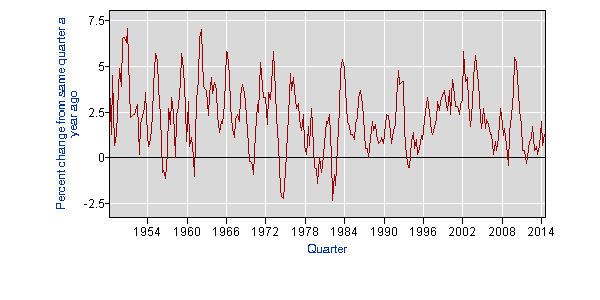December 18, 2014
There is a bizarre cult in Washington policy circles that likes to say that the markets are causing inequality, but the government can reverse the problem. E.J. Dionne treated up to an example of this cult, declaring that New York Senator Charles Schumer is a main ally. The basic story is that technology and trade have displaced large numbers of middle class workers, and thereby redistributed income upward, but government can redress this problem.
Every part of this story is wrong. Let’ start with technology. Yes, computers are wonderful. Robots will displace workers. But let me tell folks a little secret. Technology has been displacing workers (i.e. costing jobs) for decades, in fact centuries. This is not new. This is not new. (I repeated that in case any pundit types are reading.) The question is the rate at which workers are being displaced. And here the news is the opposite of what we are being told. Technology is actually having less effect in recent years than in prior years because productivity growth has slowed as shown in this beautiful graph from the good people at the Bureau of Labor Statistics.
Productivity Growth (year over year change)

Source: Bureau of Labor Statistics.
Productivity growth has averaged less than 1.5 percent over the last decade. This compares to more than 2.7 percent in the quarter century from 1947 to 1973. Yes, we all know stories about robots or computers making this or that job obsolete. The point is that if we bothered to look we would know many more such stories about jobs in the 1940, 1950s, and 1960s. The fact that we may not is simply a result of ignorance or laziness. And our ignorance cannot change what is true in the world.
In short, we do not have a technology story, how about a trade story? Yep, we can find low paid manufacturing workers in places like Mexico, Vietnam, and China who are costing jobs for steel workers and auto workers in the United States. The problem is that if you think this is just a natural process, then you have not been doing much thinking.
We have been crafting trade deals for the last quarter century to bring about this outcome. The executives of companies like General Electric and Ford were sitting at the negotiating table helping to write rules that would make it as easy as possible for them to take advantage of low paid labor in places like Mexico, Vietnam, and China.
While there are hundreds of millions of people in the developing world who are happy to work in factories at much lower pay than workers in the United States, there are also hundreds of millions of people in the developing world who are smart and capable and would be delighted to work as doctors, lawyers, dentists, or other highly paid professionals in the United States. But we did not construct trade agreements to put our highest paid professionals in direct competition with lower paid counterparts in the developing world. These workers still enjoy protected labor markets. (Please do not show your ignorance by telling me that 25 percent of our doctors were educated abroad. If we had something resembling free trade it might be something like 80 percent. What percent of farmworkers are foreign born?)
So the answer here is government. It is government that increased inequality.
We can also look to our good friends on Wall Street. Why are Citigroup, Goldman Sachs, and Bank of America still in business? The answer is government. The government saved them and other financial behemoths from their own incompetence during the financial crisis. And, the government gives the Wall Stree crew favoritism by not taxing it the same way as other sectors. (Jeff Bezos, the owner of the Post, also got rich from special tax treatment.)
We also have high drug prices due to government granted patent monopolies. We spent $380 billion on drugs last year. We would have likely spent about one-tenth this amount if we had a free market. The difference between the government protected prices and the free market prices is roughly four times the annual budget for the food stamp program. That’s more work from the government.
And just yesterday the Fed was debating raising interest rates to keep people from getting jobs and to keep workers from getting enough bargaining power to raise their wages. (Thankfully, it didn’t.) This is yet another place where the role of government in promoting the upward redistribution of income has been important. The Fed has kept the unemployment rate much higher since 1980 than before 1980.
So Dionne and Schumer are right. We need government, as he said repeatedly in the column. We need government to stop pursuing policies to give the rich all the money. Unfortunately, Schumer is not talking seriously about the real problem. He is putting on a silly show.
One more point, the Affordable Care Act is not just about being decent people and covering the relatively small number of uninsured. It is about ensuring that those of us who currently have insurance will still have insurance if we lose or leave our job. This is huge since more than 4.5 million people lose or leave their job every month. In the world outside of elite circles this is a huge deal. Apparently folks like Schumer are so disconnected from where most of the country lives that they don’t even recognize this problem.







Comments